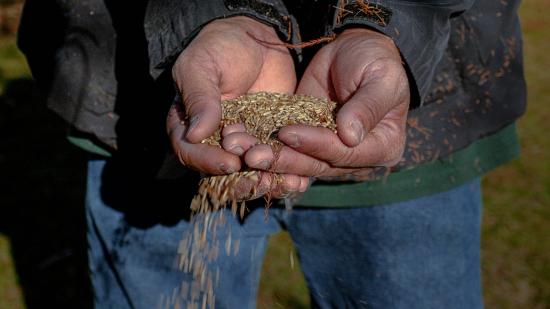Climate policy programs need to work for farmers’ bottom lines. That is the foundation of the Rural Investment to Protect our Environment (RIPE) organization, led by executive director Aliza Drewes.
“In regard to climate policy, there hasn’t been a significant reason for rural stakeholders to commit because there was the negative downside of potential costs, potential regulations, and to date, carbon farming programs have been designed to only compensate producers for greenhouse gas value, which, in most cases, is less than the cost of the practice,” Drewes says.
By talking with farmers and policymakers across the country, RIPE has worked out an idea of a price floor that would guarantee farmers a reasonable return and also public value.
The program, called RIPE100, would pay farmers $100 per acre or animal unit for voluntary stewardship practices like carbon sequestration, greenhouse gas reduction, improved soil health, water quality, water conservation, and other environmental services.
The steering committee for RIPE consists of farmer advisors across the country. One of those is Brandon Hunnicutt, who farms with his father and brother on 2,400 acres of corn, soybeans, and popcorn located south of Grand Island, Nebraska.
“It’s been fascinating to see the widespread interest in this from producers with different commodities and animal units across the country,” Hunnicutt says. “While we all face unique problems, as farmers we do have the same core challenges when it comes to the weather, soils, and water. So we’ve come together to develop and move this policy forward in a way that works for everyone.”
Echoing this sentiment, Jerry Hatfield, Ph. D., Ag Industry Advisor for The Context Network says, “Increasing carbon in the soil benefits water and nutrient availability which contributes to yield stability and climate resilience, but most of all it increases profitability back to the producer.”
RIPE100 Pilot Program
In September, RIPE advanced a pilot partnership that was awarded $80 million through Virginia Tech as the prime applicant from the USDA Partnerships for Climate-Smart Commodities program. This funds the RIPE100 pilot in Arkansas, Virginia, North Dakota, and Minnesota.
Farmers participating will implement a climate-smart practice that has been vetted to and proven to deliver over $100 of public benefits, primarily in water quality, soil health, and air quality, which Drewes says have more significant dollar value than greenhouse gas alone.
The pilot is designed with an easy enrollment process, equitable payments, and technical support. Because it is a public program without the constraints of a private market, there is no penalty for early adopters of conservation practices. If farmers have already implemented no-till, cover crops, prescribed grazing, etc., they may still be compensated through RIPE100 because those practices continually provide public benefit.
For this reason too, farmers can choose to concurrently participate in private carbon markets.
“We have designed this public program to not claim the environmental asset, so this complements the private market,” Drewes says. “We also know that the private market has a lot of complexities that don’t work for all producers and the payment level doesn’t work for all producers, so this could be an alternative for someone.”
RIPE can ensure the public benefit is provided by using statistically-representative soil samples and extensively-gathered USDA data rather than requiring sampling on each farmer’s operation. This also enables the program to scale across the U.S. and also for RIPE to partner with other organizations who may have specific monitoring and verification processes in place.
Farm Bill Platform and Future Opportunity
Part of the pilot program includes RIPE hosting national roundtables to discuss how this concept can be implemented at the USDA on a regulatory level.
“We released our farm bill platform this year, which advocates to use existing funds authorized through the Inflation Reduction Act to support our concept,” Drewes explains. “In so doing, we can get moving immediately and pay producers to get these practices in the ground and refine the details over time.”
To bring the program to a resolution and expansion, Hunnicutt advises leveraging working relationships with your representatives.
“I think one of the things farmers have to remember is everything that happens on a national level starts at the grassroots and a lot of times, it starts with a farmer sitting in a coffee shop coming up with ideas to take to the local association and beyond,” Hunnicutt says.
The scale of climate funding available today is much greater than ever, says Drewes, and there is tremendous economic opportunity to be part of it.
“Farmers can very reasonably have different opinions about government spending and we totally understand there are very reasonable differences of opinion on that. However, what is not negotiable is the fact that Democrats are looking to spend money on climate. And so given that that is the case, we have an opportunity to get a significant amount of funding expanded,” Drewes says.
Hunnicutt’s perspective as a farmer is that financial support like RIPE100 can provide takes some of the risk off the table.
“As farmers, we really need to consider what practices we can change that will increase our return on investment,” he says. “At the end of the day, farmers are worried about whether they can farm another year. If some of the financial risk is removed, we can make changes that also have a benefit for mitigating climate change and ensuring we have healthier soils, cleaner water, and cleaner air.”
For helpful resources provided by RIPE, visit riperoadmap.org.
Context Network
This article is part of the SF Carbon Connection, a joint carbon market project between Successful Farming magazine and The Context Network, West Des Moines, Iowa. We are developing editorial content regarding existing carbon markets and carbon programs available to farmers. Each month, Successful Farming magazine and Agriculture.com will contain stories that enable farmers to dig deeper into carbon markets. The mid-November issue of Successful Farming magazine will also feature carbon market stories. Future carbon market coverage may also convey information through other media platforms.
